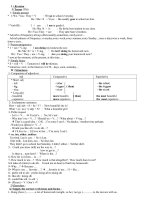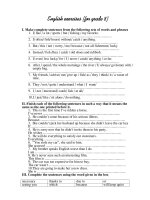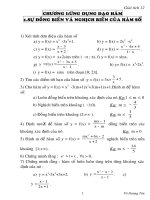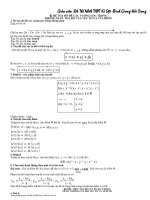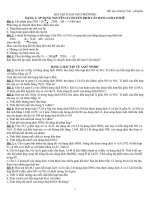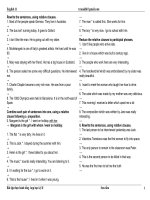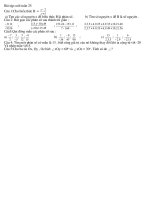Bài tập thêm
Bạn đang xem bản rút gọn của tài liệu. Xem và tải ngay bản đầy đủ của tài liệu tại đây (166.07 KB, 13 trang )
Prepared by Nguyen Sy Chien, : 0343 742 160
Monday, July 29, 2013
Test of English for elementary students
Time allowed: 40'
Chọn một phơng án trả lời đúng nhất trong các phơng án A, B, C và D điền vào chỗ trống hoặc trả lời
các câu hỏi sau:
Câu 1: You must be (taller). (Choose the antonym (từ trái nghĩa) of the word in bracket)
A. longer B. smaller C. shorter D. higher
Câu 2: They (remember) that story. (Choose the antonym of the word in bracket)
A. read B. miss C. forget D. mind
Câu 3: Bill is one of .................. friends.
A. her B. she C. hers D. ours
Câu 4: The deaf (điếc) and mute (câm) person is unable .............................. anything.
A. hear and talk B. to hear and talk C. hearing and talking D. heard and talk
Câu 5: Choose the word having different pronunciation from the others.
A. mood B. fool C. food D. blood
Câu 6: Please ..................... your radio. I can't learn my lessons.
A. put down B. let down C.slow down D. turn down
Câu 7: We aren't ..................... enough to travel everywhere by taxi.
A. strong B. rich C. poor D. weak
Câu 8: Nam asked his classmate............................. him an English book.
A. lent B. to lend C. lend D. lending
Câu 9: Lan told her friends not .............................. reference books out of the library.
A. to take B. taking C. take D. taken
Câu 10: Reference books ......................... on the shelf.
A. are keeping B. are kept C. keep D. is kept
Câu 11: I saw ................. on the way home.
A. he B. his C. him D. himself
Câu 12: ................... teacher is Mr. Pike.
A. Them B. They C. Their D. Theirs
Câu 13: You and .................. are the same height.
A. I B. my C. me D. mine
Câu 14: The doctor asked his patient to ..................... down on the couch (cáng).
A. lie B. sit C. lay D. raise
Câu 15: I have a cat and my friend ............... too.
A. have one B. has it C. has one D. have it
Câu 16: I and ....................... friends will go camping next week.
A. me B. my C. mine D. I
Câu 17: Last night, they studied hard until .....................11 p.m.
A. at B. for C. on D. no word
Câu 18: The boy is quite fond ................ picture-books.
A. in B. of C. at D. with
Câu 19: This exercise is ............................. difficult for me to do.
A. very B. too C. so D. quite
Câu 20: This grammar exercise is ............................. easy. I can do it in three minutes.
A. so B. much C. such D. more
Câu 21: They arrived ........... the station ........... time for the first train.
A. at / in B. in / on C. to / in D. to / at
Câu 22: My mother made me ....... in bed for a week.
A. stayed B. stay C. staying D. to stay
Câu 23: She ............... a pupil.
A. was B. is C. are D. were
Câu 24: Where ............... you and Vienna a few days ago?
A. weren't B. were C. are D. was
Câu 25: Was it cold last night? No, it ...............
A. wasn't B. weren't C. isn't D. was
Câu 26: He is teaching .................... French.
A. my B. I C. me D. mine
Câu 27: Do you ........ up early everyday?
A. get B. got C. stay D. take
Câu 28: Terry helped his uncle .................... the weed-killing (diệt cỏ).
A. with B. on C. from D. in
Câu 29: The topic of that discussion was very .......................
A. interest B. interesting C. interested D. interests
Câu 30: The school yard was ........................ with pupils and parents.
A. covered B. around C. crowded D. surrounded
1
Prepared by Nguyen Sy Chien, : 0343 742 160
Monday, July 29, 2013
Tµi liÖu «n tËp TiÕng Anh 10
I./ Chia ®éng tõ trong ngoÆc
Passage I
Albert Maltz was a progressive American writer. He (1. be) ___ born in 1908. He (2. write) ___ his first play
"Peace On Earth" in 1943. It was against wars, so the American police (3. arrest) ___ him and (4. put) ___ him in
prison in 1950.
Passage II
Dennis Heal is a politician. He (5. go) ___ to Oxford University in 1950 and (6. become) ___ a member of
Parliament for the Labour Party in 1957. He (7. be) ___ an MP since then. He (8. write) ___ three story books
including his autobiography. He is married to artist Adna Heal, and they (9. have) ___ two children. They (10. live)
___ in Oxford for 15 years, then (11. move) ___ to London in 1970. They now (12. live) ___ in Cadogan Square in
central London.
Passage III
Dinosaurs lived on Earth for 175 million years. During this time, species of dinosaurs (13. evolve) ___ and
becoming extinct. Sixty five million years ago the remaining dinosaurs died out.
Some scientists (14. think) ___ that a cooling of the climate caused this extinction. Others believe that the
replacement of one type of plant with the other type (15. contribute) ___ to the dinosaurs' decline.
Now, however, evidence (16. suggest) ___ a large meteorite hit the earth and (17. kill) ___ not only all the
dinosaurs, but also many other animals. Species of plants became extinct as well. After the earth's collision with
the meteorite, large clouds of dust would have thrown into the air. Many animals might not have been able to
breathe or adapt to this change in climate, and they (18. die) ___ as a result.
Passage IV
When I (19. open) ___ the door I saw a man on his knees. He clearly (20. listen) ___ to our conversation and
I (21. wonder) ___ how much he (22. hear) ___. When I (24. ask) ___ him what he (25. do) ___, he said that he
(26. drop) ___ a 50p outside the door and (27. look) ___ for it.
Passage V
Mary (28. have) ___ to go to New York last week, but she almost (29. miss) ___ the plane. She (30. stand)
___ in the queue at the check-in-desk when she suddenly (31. realize) ___ that she (32. leave) ___ her passport
at home. Fortuntately, she (33. not/ leave) ___ very far from the airport so she (34. have) ___ time to go home to
get the passport. She (35. get) ___ back to the airport just in time for her flight.
Passage VI
Ted Holt arrived at the station at five past seven to catch the train. "Please (36. wait) ___ for me," he shouted
and jumped on the train. But the train (37. not/ move) ___ "I wonder why the train (38. not/ leave) ___ yet." he said
to the man next to him. "It always (39. leave) ___ at seven twenty," the man (40. reply) ___. Ted suddenly (41.
realize) ___ he (42. be) ___ on the wrong train! "The train to Plimpton (43. already/ go) ___ ," the man told him.
Passage VII
I thought you would like to know some of my news. I (44. arrive) ___ in New York two week ago and I (45.
stay) ___ with a family called the Browns. Mrs. Brown (46. work) ___ in a bank, but at the moment Mr. Brown (47.
not/ have) ___ a job. He (48. do) ___ a course in business management which starts next month. I (49. have) ___
a good time, here but the work is boring. I would like to find another job.
I (50. travel) ___ on the underground the other day when I met Tom. Do you remember him? When we last
(51. see) ___ him, he (52. work) ___ for his father's shop. Now he (53. learn) ___ English at school here. We (54.
see) ___ an art exhibition tonight. I'm really looking for it.
I like New York very much, but I (55. think) ___ it's very expensive. Could you do me a favour. I need some
money. Of course, I will pay you back when I see you.
II./ Bµi tËp thùc hµnh
2
Prepared by Nguyen Sy Chien, : 0343 742 160
Monday, July 29, 2013
Bài 1: Dùng các từ đ cho sau điền vào chỗ trống hoàn thành nội dung đoạn văn sau. ã (Một số từ có thể đợc
sử dụng hai lần).
until in on before
at to after back
"I live (1) ___ London. I get up (2) ___ eight o'clock and I have a bath (3) ___ breakfast. (4) ___ breakfast I
leave home and catch a bus (5) ___ the office. ___ I come (6) ___ home late in the afternoon. (7) ___ Saturday
and Sunday I don't get up (8) ___ eight o'clock. I stay (9) ___ bed (10) ___ nine o'clock and read newspaper."
Bài 2: Đặt câu hỏi cho những câu trả lời sau.
1.
A:
___ ___ ___ a bike?
B:
Yes, I have
2.
A:
___ ___ ___ ___ Ha Noi?
B:
No, I don't. I live in Ho Chi Minh City.
3.
A:
___ ___ ___ that car?
B:
Yes, they do. They like it very much.
4.
A:
___ ___ ___ a friend in London?
B:
No, she hasn't
Bài 3: Bạn h y trả lời các câu hỏi sau.ã (trả lời tự do)
1. Do you ever go to school by car?
2. Do you ever read books in the school's library?
3. Does your brother ever go to work in the evening?
4. Do your friends ever come to see you on Sundays?
5. Does your mother ever walk to work?
Bài 4: Bạn h y đọc đoạn văn sau, trả lời câu hỏi sau. ã
Hello! My name is Maria Risi. I come from Italy and I am a student at Camden English Centre. It is a
language school in Camden Town, in London: I like it here. The classes are small. There are four people in my
class. We come from different countries but we are very friendly.
Our teachers are Mr. King and Miss Baker. They are good teachers. We like them. We have three lessons in
the morning with Mr. King and two classes in the afternoon with Miss Baker.
In Italy I work in a travel agency and live with my family in Rome in a flat. My mother works in an office and
my father works in a factory.
I have got a brother and a sister, too. He is sixteen and she is twenty-one. My sister goes to university but my
brother doesn't. He has got a job in a shop in Rome. She likes his job there.
1. Where does Maria come from? 2. Where is she now?
3. Who are their teachers? 4. Where does she work in Rome?
5. Where does her mother work? 6. Where does her father work?
7. Where does her brother work? 8. Has she got a sister?
Bài 5: Dùng những từ gợi ý sau viết thành một đoạn văn hoàn chỉnh. Bạn có thể biến đổi hoặc thêm từ nếu
cần thiết.
Walter / be / engineer. He / get / at / six / and / have / breakfast / 6.30. Then he / go / work. He / start / work /
7.30. He / usually / have / lunch / canteen. He / finish / work / 5.00. He / go / home / and / have/ dinner. After
dinner / he / usually / read/ the paper / and watch / TV. He / go / bed / 10.30
Bài 6: Đọc nội dung đoạn văn sau, tìm một từ thích hợp điền vào chỗ trống.
My name (0) is John Brown. I'm 21 years (1) ___ , I'm (2) ___ student. I'm pretty outgoing. There (3) ___
four people in my family: my father and mother, my younger sister and me. My father's (4) ___ is George. He's in
3
Prepared by Nguyen Sy Chien, : 0343 742 160
Monday, July 29, 2013
his early fifties. He's a doctor. He's kind of quiet. He likes (5) ___ sports and science programs on TV. My mother's
name is Linda. (6) ___ is 50. She is a teacher of English at a high school in the city. She's very out going. She
enjoys (7) ___ meals for all of us. My (8) ___, Jane, is fifteen. She is a high school student. She (9) ___ listening
to music and drawing. She's very creative. She wants to (10) ___ an artist someday.
Bài 7: Dùng từ một (cụm) đại từ nghi vấn "wh-" hoặc "HOW -" thích hợp đặt câu hỏi cho những câu trả lời
sau:
Ví dụ:
Who teaches you English?
Mr. Nguyen. I like his lessons about the history of our country.
1. . . . . . . . . . . . . . . . . . . . . . . . . . . . . . . . . . . . . . . . . . . . . . . . . . . . . . . . . .?
About five years ago. Cars of this model were very expensive then.
2. . . . . . . . . . . . . . . . . . . . . . . . . . . . . . . . . . . . . . . . . . . . . . . . . . . . . . . . . . ?
Once or twice a month.
3. . . . . . . . . . . . . . . . . . . . . . . . . . . . . . . . . . . . . . . . . . . . . . . . . . . . . . . . . .?
About half an hour. You see, my office is not very far away.
4. . . . . . . . . . . . . . . . . . . . . . . . . . . . . . . . . . . . . . . . . . . . . . . . . . . . . . . . . .?
To get a job in a foreign company.
5. . . . . . . . . . . . . . . . . . . . . . . . . . . . . . . . . . . . . . . . . . . . . . . . . . . . . . . . . . .?
Because English is very important to my future work
Bài 8: Đặt một câu hỏi thích hợp cho những câu trả lời sau.
1. Because team learning helps us improve our English a lot.
2. Our parents grew up in a small village in the late 1950s.
3. Our grandfather will celebrate his 80th birthday next new year.
Bài 9: Trong bốn phơng án A, B, C và D có một cụm từ sai, h y chọn một phã ơng án.
1. Mickey Mouse is one of main character in Walt Disney films.
A B C D
2. Crocodile Dundee is a famous amused comedy.
A B C D
3. Harrison Ford is a talent actor in action films.
A B C D
4. There are many foreign films with subtiles in TV.
A B C D
5. The children were so amusing at the cartoon that they couldn't help laughing.
A B C D
6. I'm sorry. I haven't got any news to be told you.
A B C D
7. The furniture in our teacher's rooms are very beautiful.
A B C D
8. Tommy would rather to do any job than be out of work.
A B C D
9. In the early days of their develpoment, cars used a great number of fuel, and now they are more
A B C
economical.
D
10. We want to conserve the environment, but we can't help pollute it.
A B C D
Practice test 1
A./ Use of English
Complete each of the following sentences with a suitable verb from the box. Put the verb in the
correct form of the gerund or "to" infinitive.
4
Prepared by Nguyen Sy Chien, : 0343 742 160
Monday, July 29, 2013
take watch visit pick
help get buy read
1. Most of my classmates enjoy ___ Chinese films. But I don't.
2. Would you mind ___ me with the shopping? I need to finish this before noon.
3. Jack managed ___ the motor-bike that he wanted.
4. The young actress was hoping ___ a part in the new play.
5. Health experts advise us ___ exercise and play sports.
6. His father promised ___ him up after school.
7. Have you finished ___ the novel I lent you the other day?
8. I would really like ___ the art museum.
B./ Reading comprehension
Read the text and complete it by putting a (
√
) next to the answer A, B, C or D that best fits each space.
Passage I:
When I told my dad that (1) ___ all my exams, he (2) ___ me to our local drive-through Mc.Donald to
celebrate. While we (3) ___ at the window for some chips to be cooked, I went to the toilet inside the restaurant (4)
___ my hands. Once I (5) ___, I rushed outside, jumped into the car and started eating (6) ___ that my dad (7)
___ in his hand. It was then that I heard an unfamiliar, and angry sounding cough. I turned to discover that it
wasn't my dad in the driving seat but a rather red faced man; I (8) ___ into the wrong car! My dad (9) ___ away
from the window where they served the food and he was sitting in the car a short distance away, (10) ___ at me.
Needless to say, I didn't think it was very funny!
0.(√)A. told
B. had told C. was telling D. tell
1.A. passed B. had passed C. was passing D. was going to pass
2.A. took B. was taking C. had taken D. would take
3.A. waited B. had waited C. were waiting D. are waiting
4.A. washing B. for washing C. to wash D. washed
5.A. finished B. finish C. was finishing D. had finished
6.A. chips B. the chips C. his chips D. a chip
7.A. was holding B. hold C. was held D. held
8.A. got B. was getting C. has got D. had got
9.A. had already driven B. already drove C. was already driving D. has already driven
10.A. laughed B. laughing C. to laugh D. was laughing
Passage II:
Alfred Nobel
Alfred Nobel (0) ___ on October 21th, 1833 in Sweden. His important invention was dynamite - a powerful
explosive. This dynamite business made him a very rich man.
One day, Alfred Nobel (1) ___ about his death in a newspaper. In fact it was his brother's death. The reporter
(2) ___ him a salesman of death, "The Dynamite king". Nobel was very (3) ___. He had invented dynamite to save
life - lives (4) ___ lost because other explosives were dangerous to use. He hated violence and war. And he did
not like the world to think of him (5) ___ man of war.
He thought of best the way for people (6) ___ his fortune for years. Finally he knew (7) ___ do with his
fortune. Alfred Nobel established the Nobel Prize, (8) ___ award to honour leaders of science, literature, and world
peace.
Alfred Nobel died on December 10th 1896. He was unmarried and had no children. His important decision (9)
___ the way the world thought of him. He (10) ___ the way he wanted: Alfred Nobel, the man of peace.
0.A. is born
(√)B. was born
C. was being born D. born
1.A. heard B. saw C. read D. talked
2.A. called B. told C. thought D. knew
3.A. happy B. upset C. excited D. worried
4.A. that were B. which C. were D. who were
5.A. a B. as C. like a D. as a
6.A. used B. how to use C. to use D. using
5
